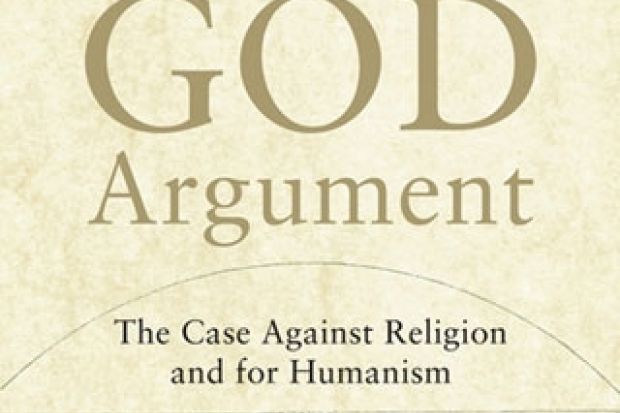The promise that A.C. Grayling makes to us is to thoroughly examine “all the arguments offered in support of religious belief” and to do so not “acerbically” but calmly. Strange, then, that he starts by thanking various “fellows in the cause”, such as (guess who) Richard Dawkins, Daniel Dennett and cheeky Peter Cave. The word “cause” is revealing of the mindset, even if the next line strikes an unconvincing note of inclusivity, offering, like a poorly structured sermon, “that every generation must travel its own road, but with the hope of arriving at a destination further along than its predecessors”. Perhaps a wiser thought and a better metaphor would have been: every publisher must produce its own book explaining the same points about religion, but with the hope that each sells more than its predecessors.
This book, however, is supposed to be different - a philosophical examination of the arguments. That is perhaps why it is called The God Argument. Or perhaps the publisher came up with the name after Grayling submitted it. Although it is full of arguments in one sense: what philosophers call ad hominem ones directed at “religious apologists”. Thomas Aquinas, Leibniz and no doubt the local vicar would all fit into this group - but not, it seems, Buddhists or followers of Confucius, as these “are philosophies”. Which means that they are all right.
Religion is like jelly - constantly shifting, so that just as you land a good blow, it wobbles to another place
Religion, as presented here, has negligible philosophical content. Rather it seems to consist of hanging homosexuals, beheading or stoning to death adulterous women and subordinating “women and children” in Bible Belt America. “Throughout history, the religion-inspired suppression of women has robbed humanity of at least half of its potential creativity and genius.” We’re only on page two, by the way, of this exemplification of “calm rationality”, as a review from the Church Times promises on the back cover.
But it doesn’t seem very philosophical to me. Indeed, although Grayling accuses “supporters of religion” of making lots of silly, elementary errors of logic, doesn’t he himself commit the fallacy of affirming the consequent?
If religion is an evil influence on people, then people’s minds will be addled and lots of bad things will result. (First premise.)
People’s minds have been addled and lots of bad things have resulted. (Second premise.)
Religion is an evil influence on people. (Wonky conclusion.)
The problem with this reasoning is that there could be another explanation for the bad things - like maybe inbred sexism, or aggressive pursuit of economic self-interest. But that, I suppose, is sociology. Here we only do logic. Mind you, some claims do look rather sociological, such as: “Whereas the consolations of religion are mainly personal, the burdens are social and political as well as personal.” It is likely that Grayling has no time for the Protestant work ethic that made being rich virtuous and justified the entire capitalist system - generally seen as an important factor in social development - or perhaps he would rather we returned to a kind of philosophical Year Zero, “before religion”. What would that be like? Ah, read part two.
“Briefly put, critical examination of religion’s claims puts it in the same class as astrology and magic. Like these systems of thought, religion dates from mankind’s less educated and knowledgeable early history and like them it has been superseded by advances in our understanding of the world and ourselves.” Everywhere that science and education have advanced, so religion has dwindled in influence, Grayling says, neglecting the contrary example of the US (or indeed the long history of religion in nurturing learning). A list of people hoping “to see the human liberated from religion and superstition” is offered, starting, of course, with Dawkins and Dennett (but not Cave) and ending with that great humanitarian, Christopher Hitchens. Parmenides, Plato, Confucius, ignorant folk like that, must yield to those who have seen further.
The task of communicating the new knowledge, however, is complicated by the fact that religion is like jelly - constantly shifting position, so that just as you land a good blow on it, it wobbles to another place. (Take that, Church Times reviewer!) “This is in large part because the religious themselves often do not have clear ideas…about what is meant by ‘religion’, ‘god’, ‘faith’ and associated concepts.”
In fact, religious belief at root is either self-contradictory or meaningless. From such a starting point, anything at all follows “logically”, Grayling explains. Quite so, but what then is the relevance of logical arguments to dismantle the religious edifice? It would seem, on the author’s own account, a fool’s enterprise.
The God Argument: The Case Against Religion and For Humanism
By A.C. Grayling
Bloomsbury, 288pp, £16.99
ISBN 9781408837405 and 9781408837429 (e-book)
Published 14 March 2013
Register to continue
Why register?
- Registration is free and only takes a moment
- Once registered, you can read 3 articles a month
- Sign up for our newsletter
Subscribe
Or subscribe for unlimited access to:
- Unlimited access to news, views, insights & reviews
- Digital editions
- Digital access to THE’s university and college rankings analysis
Already registered or a current subscriber? Login




